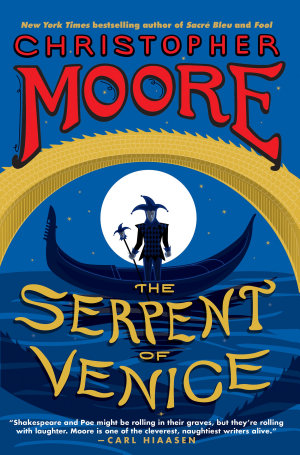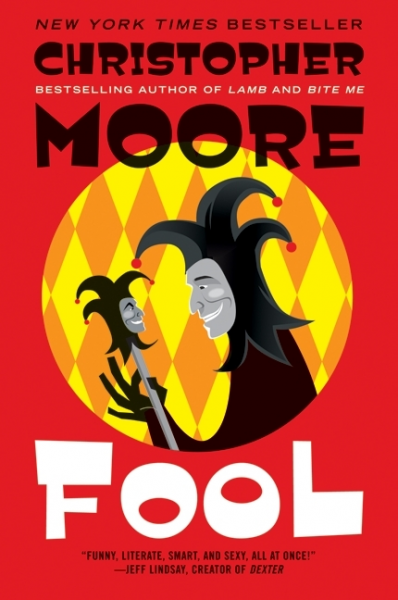We all have literary crushes. From Mr. Darcy to Remus Lupin, I’ve had my own share, but there was one that I was reluctant to divulge because it was just such an odd choice—the nameless Fool from Shakespeare’s KING LEAR. I know…weird. Maybe it was because I have a weakness for sarcastic smart alecks, or because I pictured him like Jon Stewart, but the Fool enraptured me.
But with such an idiosyncratic and obscure crush, there was nothing for me to do with this little flame. That is, until I discovered Christopher Moore’s FOOL. Moore, with his witty, smart, and even heartbreaking novels, has a rabid fan base. He’s made me laugh out loud many times, but it was through Shakespeare that I first discovered him.
I should warn you that if you are the type of person who takes Shakespeare and high art seriously, you might not enjoy Moore’s retelling of the tragedy of King Lear. It’s shamelessly bawdy, snarky, and quite happy to destroy any sense of solemnity the Bard’s tragedies may possess. Naturally, I love it.
Quite simply, this is a retelling of KING LEAR from the Fool’s perspective. The Fool—named Pocket here—is not merely the wise observer of the play but the instigator of the action. He weaves plots of revenge and political subterfuge while juggling and larking his way into the princesses’ beds. He struggles to keep the mad king from doing anything too mad and to bring the exiled Princess Cordelia—his beloved—home. Even with his ribald jokes and madcap dealings, Moore imbues Pocket with a genuine heart and a sharp tongue.
With a whip-smart, fast-paced, and surprisingly suspenseful plot, FOOL is the rare adaptation that feels natural and effortless. Its sequel, THE SERPENT OF VENICE, is also hilarious but surprisingly moving. I was thrilled to discover that Moore had decided to bring back my darling fool in this mash-up of OTHELLO and THE MERCHANT OF VENICE.
In this tale, Pocket is still crafty and lewd, but now he carries a broken heart. Traveling to Venice after the death of Cordelia, he stumbles upon a murderous plot led by the evil Iago. As Pocket keeps getting in the way of Iago’s quest for money and power, Iago realizes there’s only one way to silence a fool forever—death. Luckily, Pocket is too wily to be murdered and embarks on yet another frantic adventure to save Othello, reunite him with Desdemona, ensure that Iago never gets his way, and maybe heal his own heartache.
Featuring appearances by Marco Polo, a sea serpent, a ghost, and even more complicated plots of revenge and power, THE SERPENT OF VENICE is more farcical than its predecessor and yet is also reflective and melancholy. In it, Moore doesn’t shy away from plainly discussing grief, racism, prejudice, and other heavy topics. Here, Pocket is a bit older, wiser, and more introspective. He persists in his quest to right wrongs, but as usual, he never fails to cheerfully offer up snarky, sarcastic comments to irritate his enemies.
It’s difficult to choose which of the two novels is superior because they’re both so enjoyable and frankly, I think I’d like any book that features Pocket. We could all learn a thing or two from this clever fool.









